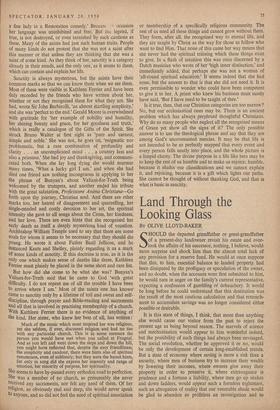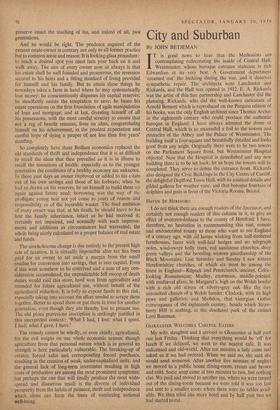Land Through the Looking Glass
BY OLIVE LLOYD-BAKER SHOULD the departed grandfather or great-grandfather of a present-day landowner revisit his estate and over- look the affairs of his successor, nothing, I believe, would more surprise and shock him than the alMost total lack of any provision for a reserve fund. He would at once suppose that this, to him, essential balance to landed property had been dissipated by the profligacy or speculation of the owner, and no doubt, when the accounts were first submitted to him, he would turn in anger on the family's current representative, expecting a confession of gambling or debauchery. It would be long before he could understand that this destitution was the result of the most cautious calculation and that retrench- ment to accumulate savings was no longer considered either possible or desirable.
It is this state of things, I think, that more than anything else would cause our visitor from the past to reject the present age as being beyond reason. The marvels of science and mechanisation would appear to him wonderful indeed, but the possibility of such things had always been envisaged. The social revolution, whether he approved it or no, would be only the development of certain long-established trends. But a state of economy where saving is more a risk than a security, where men of business try to increase their wealth by lowering their incomes, where owners give away their property in order to preserve it, where extravagance is prudence and a fortune a liability, where men go up snakes and down ladders, would appear such a formless nightmare, such an abrogation of reality that our venerable shade would be glad to abandon so profitless an investigation and to preserve intact the teaching of his, and indeed of all, past generations.
And he would be right. The prudence required of the present estate-owner is contrary not only to all former practice but to common sense and reason. It is looking-glass procedure : to reach a desired spot you must turn your back on it and walk away. The aim of every owner now as always is that his estate shall be well founded and prosperous, the reversion secured to his heirs and a fitting standard of living provided for himself and his family. But to attain these things he nowadays takes a farm in hand where he may systematically lose money; he conscientiously disperses his capital reserves; he steadfastly resists the temptation to save; he bases his estate operations on the firm foundation of agile manipulation of loan and mortgage; and at last, divesting himself of all his possessions, with the most careful scrutiny to ensure that not a rag of benefit remains, lives on alms, congratulating himself on his achievement, in the prudent expectation and careful hope of dying a pauper of not less than five years' standing.
So completely have these Bedlam economics replaced the old standards of thrift and independence that it is as difficult to recall the ideas that then prevailed as it is in illness to recall the sensations of health; especially as to the younger generation the conditions of a healthy economy arc unknown. In those past days an owner improved or added to his estate out of his own savings and those of his forbears; when he hml so drawn on his reserves, he set himself to build them up again against future need; borrowing was the way of the profligate young heir not yet come to years of reason and responsibility or of the incurable waster. The final ambition of every owner was that, at his death, he should leave to his heir the family inheritance, intact as he had received it; certainly not impaired, and normally with such improve- ments and additions as circumstances had warranted; the whole being nicely calculated to a proper balance of real estate and funds.
The unwholesome change is due entirely to the present high rate of taxation. It is virtually impossible after tax has been paid for an owner to set aside a margin from the small residue for conversion into savings, that is into capital. Even if this were somehow to. be contrived and a sum of any con- sideration accumulated; the, unpredictable fell swoop of death duties would raid this store, hard won from agriculture and intended for future agricultural use, without benefit of the agricultural reduction. It is folly to expose funds to this risk, especially taking into account the effort needed to scrape them together. Better to spend them or put them in trust for another generation, even though they are thereby lost to present use. The old pious gravestone inscription is strikingly justified in this unexpected context: `What I had, I lost; what 1 spent. 1 had; what I gave, I have.'
The remedy cannot be wholly, or even chiefly, agricultural, for the evil weighs on our whole economic system; though agriculture from that personal nature which is in general its strength is here particularly vulnerable. The breaking-up of estates; forced sales and corresponding forced purchases, resulting in the creation of weak, under-capitaliSed units; and the general lack of long-term investment resulting in high costs of production are among the most prominent symptoms; but perhaps the one that will finally produce the most wide- spread and disastrous result is the divorce of individual prosperity from the habits of patience, thrift and independence which alone can form the basis of continuing national well-being.



































 Previous page
Previous page